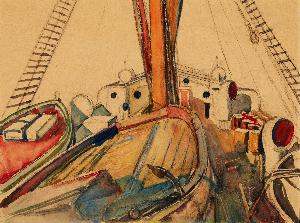Frederick Horsman Varley
Frederick Horsman Varley;Frederick Varley
Place: Sheffield
Born: 1881
Death: 1969
Biography:
Early Life and Artistic Beginnings
Frederick Horsman Varley, a prominent figure in Canadian art history, was born on January 2, 1881, in Sheffield, England. His artistic journey began at the tender age of 11, with studies in art in Sheffield (1892-1899) and later at the Académie Royale des Beaux-Arts in Antwerp (1900-1902), Belgium, where he worked on the docks.
War Artist and the Shaping of His Perspective
Varley's experience as a war artist during World War I significantly influenced his perspective. He served from 1918, accompanying Canadian troops in the Hundred Days offensive and capturing the brutality of war in his paintings. Notably, For What? (1918), a poignant piece depicting a gravedigger amidst the chaos, is one of the few official Canadian First World War paintings that confronts the reality of battlefield death.
The Group of Seven and Later Life
In 1920, Varley became a founding member of the Group of Seven, specializing in portraiture but also exploring landscapes. His later life was marked by a move to Vancouver, BC, where he led the Department of Drawing and Painting at the School of Decorative and Applied Arts from 1926 until 1933.
- Key Contributions: Varley's work with the Group of Seven and his portraits are his major contributions to art.
- Varley's Wikipedia Page provides a detailed account of his life and artistic endeavors.
- Explore more about Varley's artwork on Wikioo.org.
Legacy and Recognition
Varley was an associate member of the Royal Canadian Academy of Arts. The Varley Art Gallery of Markham, named in his honor, houses a significant collection of his works. He is buried at the McMichael Canadian Art Collection grounds in Kleinburg, Ontario, alongside other members of the Original Seven. Important Dates: - January 2, 1881: Born in Sheffield, England - 1920: Founding member of the Group of Seven - September 8, 1969: Passed away

